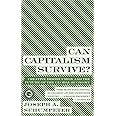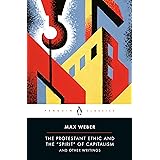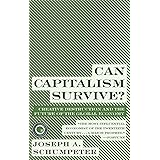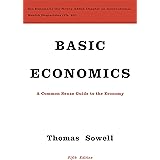Buy new:
$8.99$8.99
Buy used: $7.98





Download the free Kindle app and start reading Kindle books instantly on your smartphone, tablet, or computer - no Kindle device required.
Read instantly on your browser with Kindle for Web.
Using your mobile phone camera - scan the code below and download the Kindle app.

 Audible sample Sample
Audible sample Sample 


Follow the authors
OK
Capitalism in America: A History Hardcover – October 16, 2018
Purchase options and add-ons
Shortlisted for the 2018 Financial Times and McKinsey Business Book of the Year Award
From even the start of his fabled career, Alan Greenspan was duly famous for his deep understanding of even the most arcane corners of the American economy, and his restless curiosity to know even more. To the extent possible, he has made a science of understanding how the US economy works almost as a living organism--how it grows and changes, surges and stalls. He has made a particular study of the question of productivity growth, at the heart of which is the riddle of innovation. Where does innovation come from, and how does it spread through a society? And why do some eras see the fruits of innovation spread more democratically, and others, including our own, see the opposite?
In Capitalism in America, Greenspan distills a lifetime of grappling with these questions into a thrilling and profound master reckoning with the decisive drivers of the US economy over the course of its history. In partnership with the celebrated Economist journalist and historian Adrian Wooldridge, he unfolds a tale involving vast landscapes, titanic figures, triumphant breakthroughs, enlightenment ideals as well as terrible moral failings. Every crucial debate is here--from the role of slavery in the antebellum Southern economy to the real impact of FDR's New Deal to America's violent mood swings in its openness to global trade and its impact. But to read Capitalism in America is above all to be stirred deeply by the extraordinary productive energies unleashed by millions of ordinary Americans that have driven this country to unprecedented heights of power and prosperity.
At heart, the authors argue, America's genius has been its unique tolerance for the effects of creative destruction, the ceaseless churn of the old giving way to the new, driven by new people and new ideas. Often messy and painful, creative destruction has also lifted almost all Americans to standards of living unimaginable to even the wealthiest citizens of the world a few generations past. A sense of justice and human decency demands that those who bear the brunt of the pain of change be protected, but America has always accepted more pain for more gain, and its vaunted rise cannot otherwise be understood, or its challenges faced, without recognizing this legacy. For now, in our time, productivity growth has stalled again, stirring up the populist furies. There's no better moment to apply the lessons of history to the most pressing question we face, that of whether the United States will preserve its preeminence, or see its leadership pass to other, inevitably less democratic powers.
- Print length496 pages
- LanguageEnglish
- PublisherPenguin Press
- Publication dateOctober 16, 2018
- Dimensions6.4 x 1.65 x 9.6 inches
- ISBN-100735222444
- ISBN-13978-0735222441
Books with Buzz
Discover the latest buzz-worthy books, from mysteries and romance to humor and nonfiction. Explore more
Frequently bought together
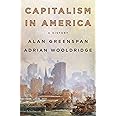
Similar items that may deliver to you quickly
 Japan’s electronic giants such as Sony, Matsushita (Panasonic), Hitachi, and Mitsubishi turned themselves into world-class export machines.Highlighted by 988 Kindle readers
Japan’s electronic giants such as Sony, Matsushita (Panasonic), Hitachi, and Mitsubishi turned themselves into world-class export machines.Highlighted by 988 Kindle readers America’s genius lay in three things that are rather more subtle than invention: making innovations more user friendly; producing companies that can commercialize these innovations; and developing techniques for running these companies successfully.Highlighted by 374 Kindle readers
America’s genius lay in three things that are rather more subtle than invention: making innovations more user friendly; producing companies that can commercialize these innovations; and developing techniques for running these companies successfully.Highlighted by 374 Kindle readers America was the first country to be born in an age of growth—an age when the essential economic problem was to promote the forces of change rather than to divvy up a fixed set of resources.Highlighted by 352 Kindle readers
America was the first country to be born in an age of growth—an age when the essential economic problem was to promote the forces of change rather than to divvy up a fixed set of resources.Highlighted by 352 Kindle readers
Editorial Reviews
Review
“Capitalism in America makes a strong case, with some wonderful insights into business history. Innovation, spread to the masses, is indeed the engine of capitalist economies.” —The Economist
“A compelling and well-documented single-volume history. It reminds us of how the US has beaten the world in the past 150 years and why it might still be unwise to bet against it now.” —The Times of London
“A masterful guide to capitalism American style . . . You don’t have to be an economics wonk to enjoy and learn from Capitalism in America.” —The Washington Times
“Capitalism in America is a delightful romp through the 400-year economic life of America from agricultural giant to industrial juggernaut to information/technology revolutionary. Stories and statistics sparkle on every page. But the book is more than a history. It is a policy guide to make sure capitalism in America flourishes like never before . . . this book is required reading for anyone who cares about life, liberty, and prosperity in America.” —The American Conservative
“Strongly recommended. This illuminating and in-depth history . . . is a valuable contribution to U.S. business history because it explains financial events and the culture of innovation from macroeconomic perspectives and offers remarkable insights into the current business climate.” —Library Journal, starred review
“A smart and engaging look at the workings of the economic machine under various regimes, isolationist and internationalist alike.” —Kirkus
“A sweeping and brilliantly told narrative by two authors who have spent their careers thinking about the wellsprings of economic growth. Anchored by the combination of Alan Greenspan’s legendary skill with data and talent for analysis, and Adrian Wooldridge’s knowledge and perspective on business history, Capitalism in America is full of insights that will surprise you and change your perspective on many of the key episodes of U.S history.” —Liaquat Ahamed, author of Lords of Finance, winner of the 2010 Pulitzer Prize
“A work of bold sweep and illuminating insight that tells nothing less than the story of American capitalism—both its extraordinary achievements and its darkest moments—from the earliest days in colonies ‘at the edge of the world,’ to the Internet revolution. Greenspan and Wooldridge combine penetrating analysis with striking portraits of the people who made it all happen, which, together, demonstrate their theme of the constant capacity for innovation and reinvention. At a time when ‘capitalism’ itself is a subject of doubt and target of assault, this is a book that the times demand, and one that will contribute much to the debate.” —Daniel Yergin, author of The Prize and The Quest and co-author of Commanding Heights: the Battle for the World Economy
About the Author
Adrian Wooldridge is a Washington correspondent for The Economist and was its West Coast bureau chief, based in Los Angeles. He is the author of Measuring the Mind: Education and Psychology in England, 1860–1990. He has written for The Wall Street Journal, The New Republic, and The Times of London, and has appeared on NPR and the BBC.
Product details
- Publisher : Penguin Press; First Edition (October 16, 2018)
- Language : English
- Hardcover : 496 pages
- ISBN-10 : 0735222444
- ISBN-13 : 978-0735222441
- Item Weight : 1.8 pounds
- Dimensions : 6.4 x 1.65 x 9.6 inches
- Best Sellers Rank: #80,710 in Books (See Top 100 in Books)
- #26 in Development & Growth Economics (Books)
- #161 in Economic History (Books)
- #1,839 in United States History (Books)
- Customer Reviews:
About the authors

Discover more of the author’s books, see similar authors, read author blogs and more

Discover more of the author’s books, see similar authors, read author blogs and more
Customer reviews
Customer Reviews, including Product Star Ratings help customers to learn more about the product and decide whether it is the right product for them.
To calculate the overall star rating and percentage breakdown by star, we don’t use a simple average. Instead, our system considers things like how recent a review is and if the reviewer bought the item on Amazon. It also analyzed reviews to verify trustworthiness.
Learn more how customers reviews work on AmazonReviews with images
-
Top reviews
Top reviews from the United States
There was a problem filtering reviews right now. Please try again later.
Greenspan sees this happy confluence of events rapidly coming to an end because of slowing productivity gain in the last fifteen years. America is entering a stagnation phase, haunted, in part, by over-regulation and entitlement. Given the demographics, this will get much worse during the coming decades. Greenspan sees the political consequence of this pain of “destruction” and how it is affecting less educated white men making up Trump’s base. The post-WWII GI Bill and expanding economy enabled returning young men to move to the suburbs to build families and careers during the sixties and seventies. The impact of global competition, massive entry of women into the labor force, and information technology caused widespread dislocation among the white working class. Greenspan characterizes this “Death From Despair” common among the unemployed. “Nonwork often goes along with a life of petty crime and drug addiction,” opioids and meth in particular.
Greenspan proposes (1) deregulation, (2) restructure entitlement benefits and (3) raise capital reserve requirements in banks to reduce systemic risks. Given the political climate, these will take years to pull off. Concurrently, we need to seriously look at the impact of machine learning and robotics on employment. Instead of focusing just on Medicare Medicaid and Social Security, we need to understand the cost of universal income and potential funding mechanism. The world is radically changing and we need to be ready.
There is little polemic on socialism or Marxism; that history speaks for itself. It is straightforward with lots of colorful quotes, anecdotes and trivia.
The upshot is that what’s going to destroy our economy is entitlements; specifically the unaffordable Social Security, Medicare, and Medicaid programs. Basically, the age is too low.
What better measurement of a great book when you realize how much you didn’t know.
Samples:
“America has more miles of navigable rivers than the rest of the world combined.”
“In 1900, there were only two official holidays . . . Independence Day and Christmas.”
“[Sweden] Astrid Lindgren, the creator of Pippi Longstocking, received a tax bill for 102% of her income.”
It’s def. a must read.
I don’t have any serious complaints - except one comment: I wish Greenspan (who served a very long tenure as Fed chairman in a very critical era) would have touched more on Federal reserve + their policies and reasonings for doing XYZ throughout each key era (especially since his insight would be very unique + important in that regard). But instead ~ he barely talks about Fed at all (even though the Fed was a major driver of US boom/bust cycles even in it’s early-predecessor days in the 1800’s as the US national charted bank)
Also - he may be a bit bias since he was the Fed chair leading up to 2008 - but he doesn’t exactly explain the Fed’s excessive easing from 2001-2005 (maybe a sensitive topic for him?)
But that’s my only nitpick
Top reviews from other countries
• Productivity: under the conception described by the authors it is the society’s ability to get more output from a given input (they say this is a Technical economic issue).
• Creative Destruction: they use this concept as defined by Schumpeter and describe it as the process that drives productivity growth (this is an economic issue that also touches on some of most profound problems of social philosophy)
• Politics: it deals with the fallout of creative destruction (This one takes us far from the world of charts and numbers into the world of practical politics)
These three themes are throughout the whole book and the authors put a lot of effort to link all the stories and facts to one of these themes which helps the readers understand more about what they are trying to explain.
The book is pretty much a romantic version of a summary of the history of the United States, from its independence to the present (2018) It's clear to me that the authors are somehow proud of what America has become and, even though at the end they explain how the economy of the country has declined and they try to give some explanation to it.
It's just a <500 pages story about how America has become to what it is now, and bring up some data that compare America against Europe and mainly the UK which is the one that gave birth to it.
Here the authors explain the key decisions in America's history that led them into a world, as they describe it, of innovation, freedom, a place where creativity is well rewarded. They explain how the immigrants had a huge impact in how the main cities were build.
They talk about how the geographical, historical moment of America's beginnings made it perfect for a country to start, the social and political context allowed the construction of a new and better community, a new and better government.
It is worth saying that by the extension of the book they will lack of a lot of things, important things such as social and even economic issues that were encountered throughout the history of America which are persistent now a days. <500 pages aren't enough to discus all this. But still the book isn't about it, is it. The economic perspective that it gives which is how capitalism (along with the three themes described at the beginning) are seen and were the driving force of economic growth of an economy that was in simple words very young to the point of becoming the main economy of the world, and as they describe it, the most successful economy in history.
Whether I agree or not with the book (completely or partially) that is not relevant from my perspective, but let me say that this is a good book for those that aren't too deep into economics or history. If you are really deep into this and you are in search of new perspectives and ideas… well this might not be for you.
I give it five stars because despite not being what most expected, is a good book, a little repetitive in the first 100 pages but still.




